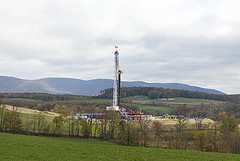
UNIVERSITY PARK – A new multi-university initiative that’s been announced will provide best-practices training for people working in the rapidly growing shale natural gas and oil development sector. The effort involves Penn State, the University of Texas at Austin and the Colorado School of Mines; training programs will be led by faculty at each academic institution and are designed to ensure that regulators and policymakers have access to the latest technological and operational expertise to assist in their oversight of shale development. ExxonMobil and GE, two major U.S. energy corporations, each will contribute $1 million to the new educational effort.
As part of the initiative, the Penn State Marcellus Center for Outreach and Research has added the Shale Gas Regulators Training Program.
“The program affords the University a unique opportunity to further develop shale gas best-management practices and to offer new regulators the chance to learn the latest science-based concepts related to geology, petroleum technology and environmental quality,” said Thomas Murphy, co-director of the Penn State Marcellus Center for Outreach and Research. “Penn State looks forward to providing development training that will help ensure a strong, yet consistent, regulator process across the Appalachian Basin.”
The training program will draw upon Penn State’s significant expertise in shale-gas geology, reservoir engineering and related sciences, and also upon University researchers’ leadership in advancing the understanding of the environmental, economic and social issues related to shale-gas development.
In addition, a training program for regulators in the oil and gas industry has been added in the University of Texas at Austin’s Center for Petroleum and Geosystems Engineering, and a program of courses designed to provide training in the responsible development of unconventional energy resources has been added in the Colorado School of Mines’ Unconventional Natural Gas and Oil Institute.
While hydraulic fracturing, horizontal drilling and other technologies used to produce shale gas are not new, they are being used today on a larger scale than ever before. Because it is critical that regulators and policymakers have access to a sound scientific understanding of shale-energy development, and that they are fully aware of the technologies required to produce these resources safely and efficiently while protecting the environment, GE and ExxonMobil have offered their support for the training initiative.
“Natural gas is dramatically changing the way we power America and GE is committed to its responsible development,” said GE CEO Jeff Immelt. “We believe advanced technology, an expert workforce, and smart regulation are the keys to America leading the world in shale-gas development. As a technology leader in the energy sector, GE recognizes the importance of minimizing a site’s environmental footprint while simultaneously increasing operational efficiency.”
The benefits of the overall training initiative are expected to be felt not only in the oil and gas industry, but by state and federal regulators, and policymakers.
“America’s shale-energy resources are creating jobs and economic growth in regions across the country, and Americans rightly want to know that these resources are being produced safely and responsibly,” ExxonMobil CEO Rex Tillerson said. “ExxonMobil is pleased to provide the resources to assist the schools in equipping regulators with the latest technical and operational knowledge being applied in this growing sector.”
GE produces nearly 40 technologies for the shale-gas sector in areas such as mobile and fixed water filtration, flare-gas capture and reuse, cleaner on-site power generation, and demand-side solutions that create liquefied or compressed natural gas for use in truck fleets and other areas.
ExxonMobil is the world’s largest non-government-owned energy company and applies advanced technology to the development and production of oil, natural gas and petrochemicals. The company is the largest natural gas producer in the United States, with a significant position in the production of shale resources in Pennsylvania, Texas, Louisiana, Arkansas, Colorado, New Mexico, Utah, Oklahoma and North Dakota.